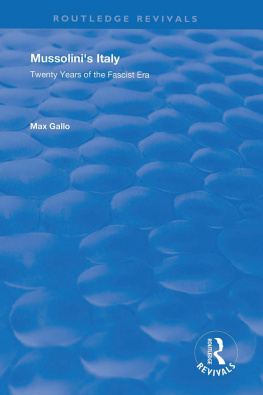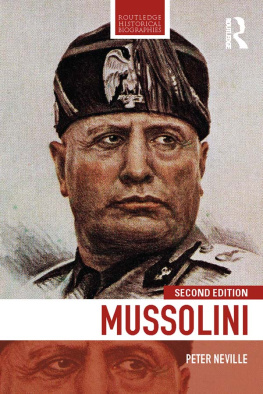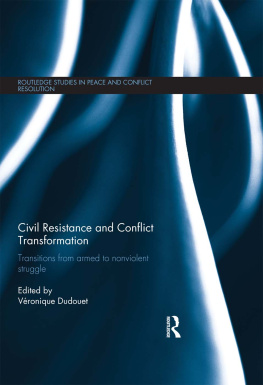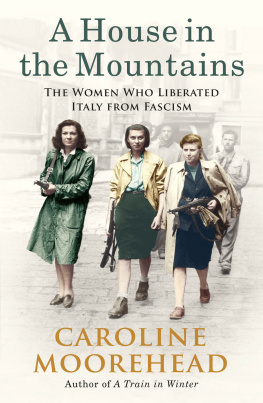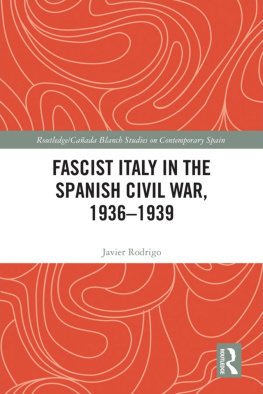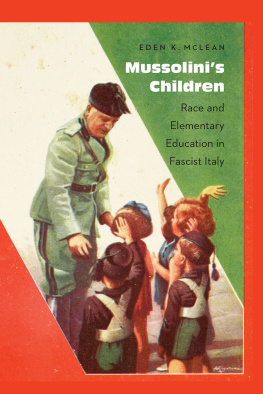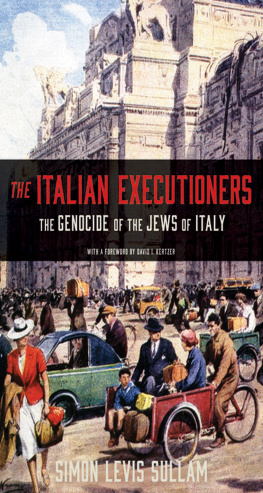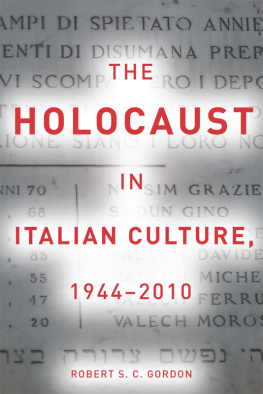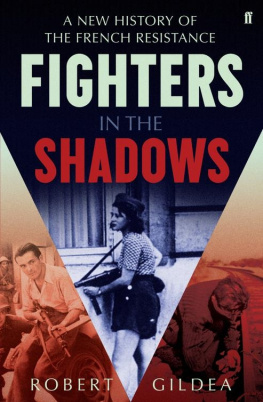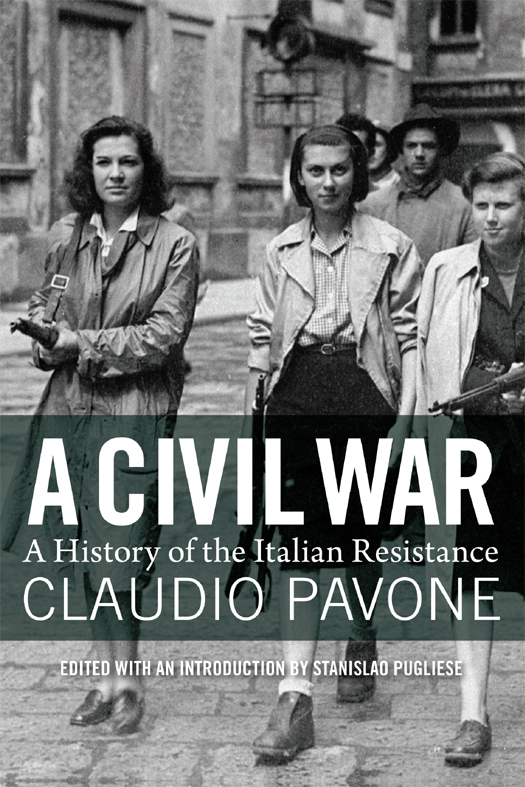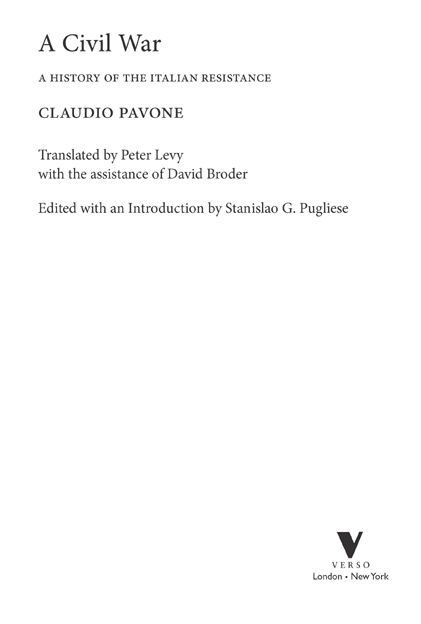First published by Verso 2013
Translation Peter Levy 2013
Introduction Stanislao G. Pugliese 2013
All rights reserved
The moral rights of the authors have been asserted
Verso
UK: 6 Meard Street, London W1F 0EG
US: 20 Jay Street, Suite 1010, Brooklyn, NY 11201
www.versobooks.com
Verso is the imprint of New Left Books
ISBN-13: 978-1-84467-750-4
British Library Cataloguing in Publication Data
A catalogue record for this book is available from the British Library
Library of Congress Cataloging-in-Publication Data
Pavone, Claudio.
[Guerra civile. English]
A civil war : a history of the Italian resistance / Claudio Pavone; translated by Peter Levy with the assistance of David Broder; introduced by Stanislao G. Pugliese.
page cm
Originally published as: Guerra civile. Torino : Bollati Boringhieri, 1991.
ISBN (US): 9781781682364
ISBN (UK): 9781781685419
Includes bibliographical references.
ISBN 978-1-84467-750-4 (alk. paper)
eBook ISBN: 978-1-78168-236-4
1. ItalyPolitics and government1943-1947.
2. World War, 1939-1945Underground movementsItaly. I. Title.
DG572.P3513 2013
940.5345dc23
2013029227
v3.1
To my daughters
Liberiana, Flaminia and Sabina
Contents
INTRODUCTION
The Italian Resistance: Three Wars and the Eternal Struggle for the Past
The past is never dead. Its not even past.
William Faulkner, Requiem for a Nun, 1950
Nearly seventy years after the end of the Second World War, the armed Resistance against fascism in both its Italian and German variants is still the caesura of contemporary Italian politics, society and culture. Historically, psychologically, and culturally, it functions much like the Dreyfus Affair in France or the Civil War in the United States. As in France, the Italian Resistance evolved its own necessary mythology, thereby generating a counter-narrative of rightist revisionism. But from its earliest days, the Resistance, its participants and its chroniclers were aware of the sometimes morally ambiguous nature of the movement.
On its initial publication in 1991 by the Italian publishing house of Bollati Boringhieri in Turin, Claudio Pavones Una guerra civile was generally acknowledged to be the most important work of history in a generation.
Its most fundamental contribution to Resistance historiography is in Pavones delineation of three simultaneous wars: a patriotic war, a civil war and a class war. Pavone had first used the loaded term civil war at a conference in Belluno in October 1988.
This books genesis might be said to have begun with Pavones participation in the Resistance as a young man. Its more immediate birth was recounted by the author in his preface to the original Italian edition. When Norberto Bobbio invited Pavone to develop a series of seminars on the relationship between politics and morality at the Centro Gobetti in Turin, the lectures became the nucleus of this book.
Pavones original intent to focus on the institutions of the Resistance, based on his earlier essay, La continuit del Stato, was abandoned when he became convinced of the difficulty, in an essay on the Italian Resistance, of separating political, social, and institutional ideas and programmes. Instead the work refocused on analysing the behaviour of the protagonists to understand the ideas that inspired them, even if those ideas were formulated without clarity or coherence. Hence Pavones focus on the partisans themselves, without his losing sight of the political and military frameworks in which they acted. Letters, memoirs and diaries are used extensively, as are literary texts, such as those by Beppe Fenoglio and Italo Calvino.
Pavone argues that, from September 1943 to April 1945, Italy was divided by three different wars occurring simultaneously: there was a class war, a civil war and a patriotic war. The book was part of a larger trend in Italian historiography concerning the Resistance, yet it is also the single most influential piece of scholarship in the last generation. In his depiction of the vast social dimension of the Resistance and his sensitive exploration of the moral and ethical problems associated with armed resistance, Pavone has written a work that is often described as a masterpiece of the historians craft. It demonstrates the evolving and sophisticated nature of Italian historical writing a reality often not recognised outside Italy. A Civil War is not just a standard but a central point of reference in the rapidly growing body of scholarship on history and memory, so that the continued absence of an English-language edition posed a serious obstacle to a fuller understanding of these issues, making one of the finest examples of contemporary Italian historical scholarship inaccessible to Anglophone readers.
While A Civil War is universally recognised as the most important work of history and historiography in a generation, it can also be seen as the intellectual and historiographical response to Renzo De Felices monumental eight-volume biography of Benito Mussolini. Pavone has crafted a more subtle and substantive interpretation of the armed Resistance against Fascism and the Nazi occupation of Italy. Mediating between the hagiography of the left and the dismissive revisionism of the right, he has forged a new reading of the most important event in modern Italian history.
Most influential has been his reading of the Resistance as three interrelated wars. Using this imaginative and innovative framework, Pavone was able to draw together the amazingly complex events, discourses and interpretations into a new narrative. While most scholarly and popular attention has been focused on these three interrelated wars, Pavone also offers a sophisticated and ambitious chapter on the moral and political nature of violence, carefully delineating a profound difference between Fascist violence and partisan violence, thereby avoiding any moral equivalency between the two.
As readers will soon notice, 8 September 1943 looms large in the book. Much of the subsequent historiography and political mythology revolve around this seminal date. Historians and politicians still debate the symbolism and political ramifications of Italys surrender. The left saw (and sees) the date as the beginning of Italys attempt to redeem itself, with the armed Resistance as a second Risorgimento. The right offers a very different interpretation. For example, in 1996, Italian historian Ernesto Galli Della Loggia published La morte della patria, in which he equated the collapse of Fascism (July 1943) and the Armistice with the Allies (September 1943) with the Death of the Fatherland. Most historians and citizens agree that the events of JulySeptember 1943 engendered a crisis of moral consciousness and national identity, but the larger and longer-term ramifications have been the subject of widely varying interpretations. Historian Elena Aga Rossi offers an overview of the issues in commenting critically on Pavones book:
In Claudio Pavones book Una guerra civile, the choice in the days following the Armistice between loyalty to the monarchy and loyalty to Mussolini is for the first time considered a legitimate moral one. Pavone, an intellectual of the left, uses the concept of civil war to explain the struggle between partisans and exponents of the Italian Social Republic, thereby avoiding the usual condemnation of the followers of Mussolini voiced by historians of the Resistance.


